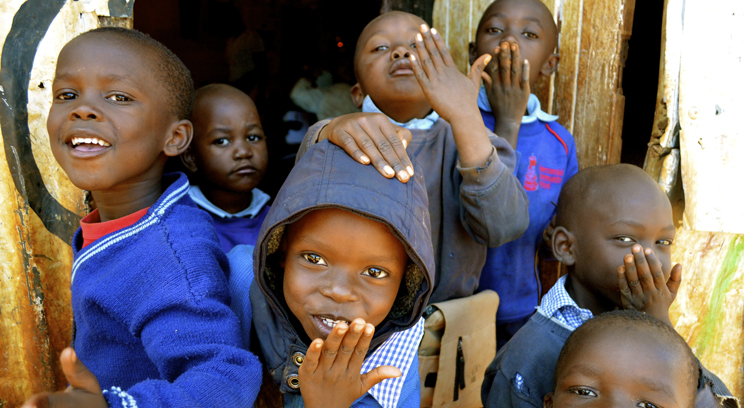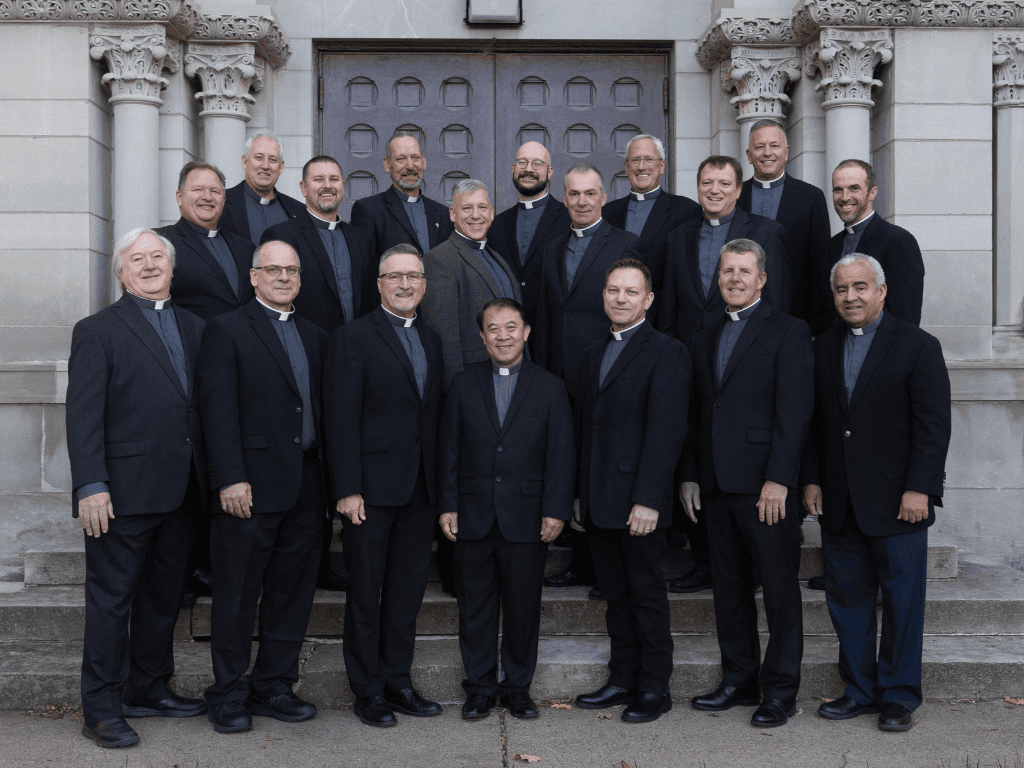“I know God will provide.”
Everyone thought I had lost it.
"You want to go to Africa … voluntarily … alone?"
Against my family's wishes, I purchased a ticket to Nairobi to spend two and a half weeks living with and learning from the people of Kenya. The first week was spent in the Kibera slum of Nairobi. The second week we traveled to a small rural village in Western Kenya called Awasi to live with the Luo tribe.
Countless people offered me advice before I left. "Don't get eaten by lions." "Be careful – you might get kidnapped." "Don't wear an American flag."
Going to a foreign land without knowing one soul on the continent was probably a risk, but it was the best risk I've ever taken. So on May 22, Nikon, passport and vaccine card in hand, I began the 22-hour journey to Kenya. I was all smiles.
Kibera is one of the largest slums in Africa, home to somewhere between 800,000 and 1.5 million people, according to locals. Some have lived in the slum their entire lives. Others moved to Kibera from rural areas in hope for a better life. As most Americans, I went to Kibera expecting utter devastation and sadness. What I found was a community bursting with life, laughter and faith. These people have nothing and are completely ignored by the government. Yet they laugh and smile more than any other group of people I have ever met. The community is relational and dependent. They are constantly outside socializing, creating, living. Their lives are based on relationships, not things. How could these children laugh so when they play amidst the trash all day? How can they shine with happiness when they don't have any toys?

The two children clinging to me were constantly at my side during my time at the Miracle and Victory Children’s Center. The kids sought constant comfort; they fought over holding my hand, being held and being hugged. It was a beautiful chaos.
I had the unique opportunity to spend my time in Kibera actually living with and among the people in the slums. My days were spent walking the streets with a woman who has lived in the slum for 23 years, eating in various people homes in the depths of the slum, exploring hidden alleyways into places few Minnesotans have been. I've read many articles and blogs about Kibera; in general, their experiences focused on the trash and devastation. By spending a week living among the people of the slum, I was able to see a side of Kibera that few have seen. The streets smell of delicious food cooking, not trash. The air is filled with lively Kenyan music, not cries. The views are riddled with smiling precious children, not dangerous machete-wielding men.
I fully expected to feel uncomfortable in Kibera – being that I come from white suburban America. I was surprised to feel comfortable there – and even more surprised to fall in love with the community. A man who had been to Kenya numerous times told me before I left, "You're going to be in Kibera that long? Wow! That's a long time to spend there. That will be really hard." Turns out, my time there was not nearly enough. Yes, Kibera is a slum. Yes, there is trash. Yes, there is poverty. But, when you see past that you find joy and faith, pure and true. These people are living proof that a mounting bank account does not equate to happiness.
The first week in Kibera was spent volunteering at Miracle and Victory Children's Center. It was founded by Monica Akinye and began as a feeding center with 10 children. Today, the MVCC offers 138 children free education and one meal a day made possible through donations from the United States. The opportunity for a free education in Kibera is extremely rare. The students were chosen because of their living conditions; half of the children are orphans and all come from extreme poverty. For some, the porridge they receive at school is their only meal.
It is impossible not to smile once you enter the MVCC, so alive with life and joy. Twenty excited children greeted us as we walked to the school. We arrived to a beating drum and dancing children. The school is crowded and lacks electricity. The children have to use the bathroom (a bag in a bucket) outside the door with no privacy. The plastic chairs are broken. There is no room for the children to lay their sleepy little heads. The conditions of the school are horrible but their spirits are soaring. The children are extremely well-behaved and so eager to learn. It is hard for them to concentrate in a room with three classes going on, but they try their hardest. There is something special happening at the MVCC where students and teachers take nothing for granted and make the best of what they have. I hope those hungry little souls continue to be fed.
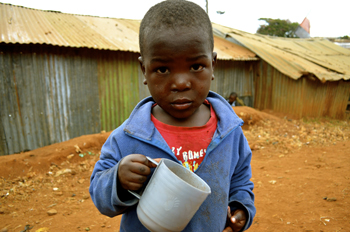
A young boy holds his cup of porridge at the Miracle and Victory Children’s Center in Kibera. The school provides one free meal a day for the children; for some this is their only meal. They were more than eager to have their picture taken with the cup of porridge.
As we walked through piles of trash to church on Sunday in Kibera, the ground literally shook from worship. They depend on God to provide everything – literally everything. The joy and faith in Kibera is real, but so is their poverty. Their spirits are alive and full of laughter, but at times they are tired and hungry. I saw far too many sad eyes of children with bulging bellies standing alone on the streets of Kibera.
You would think the people in the slums would be constantly overcome with worry as to where they will find their next meal. What I saw was Luke 12:22-26 come to life.
He said to his disciples: That is why I warn you, do not be concerned for your life, what you are to eat, or for your body, what you are to wear. Life is more important than food and the body more than clothing. Consider the ravens: they do not sow, they do not reap, they have neither cellar nor barn – yet God feeds them. How much more important you are than the birds! Which of you by worrying can add a moment to his lifespan? If the smallest things are beyond your power, why be anxious about the rest?
They trust God to provide what they need for basic survival. I spent a lot of time talking to Janet, a teacher at MVCC who has lived in Kibera for more than 20 years, about her current situation. The day before I left, she was forced to skip school and purchase secondhand clothing in Nairobi to sell for a small profit in Kibera to feed her children. This is a common business practice in Kenya. I asked her if she ever worries or gets anxious that she will not be able to provide for her children. Her response was strong and genuine, "No, I do not worry. I know God will provide."
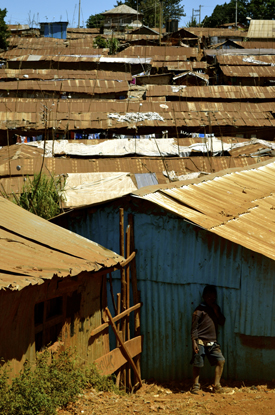
A boy stands in the shadows of the Kibera slum at the Miracle and Victory Children’s Center. The school is located in the heart of the slum.
I will never forget how sure and true her answer was. The things that I worry about are so petty and are by no means life or death worries. Janet, and countless other families in Kibera, deal with survival on a day-to-day basis and lay their anxieties and struggles at God's feet. They are certain He will remain faithful and will provide. We have so much to learn from them.
The short glimpse I had into the life of a woman in Kibera was staggering. They work so hard sunup to sundown. A pile of laundry that we would toss into the washing machine in the span of 10 seconds takes them a full day to clean – time spent fetching water for the tubs and bending over for hours scrubbing the dirt off. But they don't complain.
The day before I left, a little boy looked up at me and said, "You can't leave Africa. You are happy here." I think about those words every day. I was happy there. That wasn't supposed to happen. In the midst of trash, poverty, bucket baths and latrines, I was happy. Forget Western amenities. Forget an expanding bank account and a "nice house." Theirs is a genuine happiness not based on the things of the world that can let you down. There is so much world and so many incredible people to learn from walking this planet. I am so lucky to have lived with the poor. Any misconceptions I carried on that flight from Amsterdam to Nairobi about helping the people of Kibera were thrown out the window as they helped me more than I could have imagined. The lessons learned during the short two and half weeks spent in Kenya changed my life. It's one thing to read Jesus' words about the poor and material possessions, but to experience it firsthand is something I hope you all have a chance to do.
I now think differently. I live differently. I dream of the day my feet are covered in Kibera dirt again.
If you would like to contribute to the Miracle and Victory Children's Center or learn more about how you can support the forgotten families of Kibera, please email me at jvsmith34@gmail.com.
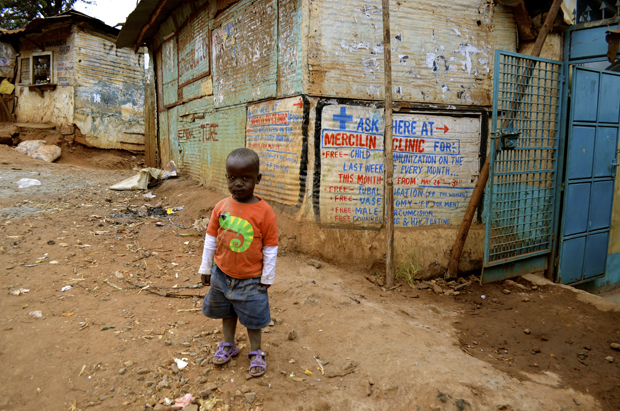
I found this little boy playing with a broken bottle of alcohol after leaving Miracle and Victory Children’s Center one day. He was not in school and no one was looking after him. His face was dirty, and his eyes hungry. This picture haunts me every day.
